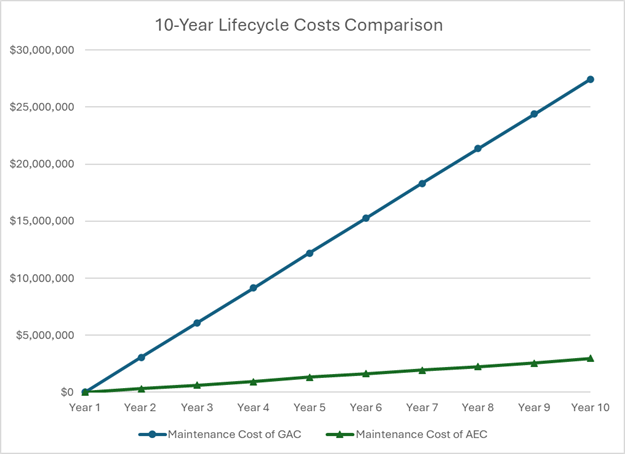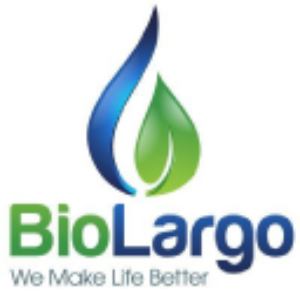BioLargo's PFAS Solution Provides Dramatic Long-Term Cost Savings Compared with Incumbent Technologies
Rhea-AI Summary
BioLargo (OTCQX:BLGO) has revealed case study data demonstrating that its AEC (Aqueous Electrostatic Concentrator) PFAS solution can achieve over 80% lifecycle cost savings compared to traditional carbon-based treatment systems. The technology effectively captures and destroys PFAS contamination to non-detect levels in drinking water, wastewater, and landfill leachate.
The significant cost reduction is attributed to the AEC's ability to generate less PFAS-laden waste compared to conventional methods like granular activated carbon (GAC) and ion exchange resins, coupled with lower replacement costs for treatment materials. Unlike traditional methods, the AEC doesn't suffer from breakthrough or channeling phenomena, particularly with short chain PFAS, leading to reduced maintenance frequency and better PFAS capture efficiency.
Positive
- Over 80% reduction in lifecycle costs compared to traditional PFAS treatment methods
- Technology effectively reduces PFAS contamination to non-detect levels
- Generates significantly less waste than carbon-based treatment systems
- Superior performance without breakthrough or channeling issues common in other technologies
- Lower maintenance requirements and reduced frequency of media change-outs
Negative
- Still requires ongoing costs for replacement membranes
- Requires separate electrochemical oxidation process for PFAS destruction
News Market Reaction – BLGO
On the day this news was published, BLGO declined 2.52%, reflecting a moderate negative market reaction.
Data tracked by StockTitan Argus on the day of publication.
Case studies show the company's innovative capture + destruction two-step approach can offer a scalable, economically feasible solution for PFAS elimination from drinking water, wastewater, and landfill leachate, capable of reducing lifecycle costs by over
WESTMINSTER, CALIFORNIA / ACCESS Newswire / May 5, 2025 / BioLargo, Inc. (OTCQX:BLGO), a company that creates and commercializes sustainable technologies to solve tough environmental and cleantech challenges, announced case study data establishing over
The over
Since the inception of federal and state regulations limiting PFAS levels in drinking water (see https://www.epa.gov/sdwa/and-polyfluoroalkyl-substances-pfas), incumbent technologies like granular activated carbon (GAC) and ion exchange resins have been found to carry substantial lifecycle costs driven by the ongoing requirement to replace media and the transportation and disposal of wastes resulting their use into landfills or incinerators. Pending regulations from the Comprehensive Environmental Response, Compensation, and Liability Act (CERCLA) would increase transportation costs for PFAS-laden waste even further.
BioLargo's AEC turns this paradigm on its head, with less ongoing media replacement, less waste, and ultimately total mineralization of that PFAS-laden waste using a separate electrochemical oxidation process. Learn more about the technology at https://www.biolargoequipment.com/pfas-solutions.
The enclosed figure based on the new case study data compares the lifecycle costs of BioLargo's AEC (in green) and a typical GAC-based system (blue) over a 10-year period. The AEC data were collected from trials with client-provided water and include ongoing costs for replacement membranes and costs to destroy the PFAS-laden waste via electro-oxidation. The GAC costs including ongoing costs for replacement carbon filters based on current pricing but do not include costs associated with transporting or disposing of PFAS-laden waste, or other costs like taxes, fees, and capital costs.

Furthermore, unlike GAC and ion exchange, BioLargo's AEC does not suffer from breakthrough or channeling phenomena that can occur with filtration media based PFAS capture technologies especially with short chain PFAS. In addition to better capturing PFAS chemicals, BioLargo engineers expect this will further reduce maintenance costs due to reduced frequency of media change-outs.
"Waste equals cost," said Tonya Chandler, President of BioLargo Equipment Solutions & Technologies. "We built the AEC specifically to capture PFAS efficiently onto small volumes of substrate. That means lower disposal costs, more affordable and less frequent maintenance, lower regulatory liability, and better, budget-friendly economics for utilities and municipalities trying to protect public health."
In an era when the public is demanding safe drinking water and the federal government is stepping up enforcement on PFAS under CERCLA, BioLargo's American-made technology offers a realistic path to addressing tough PFAS drinking water standards with less capital and operational costs than GAC and ion exchange technologies.
About BioLargo, Inc.
BioLargo, Inc. (OTCQX:BLGO) is a cleantech and life sciences innovator and engineering services solution provider. Our core products address PFAS contamination, achieve advanced water and wastewater treatment, control odor and VOCs, improve air quality, enable energy-efficiency and safe on-site energy storage, and control infections and infectious disease. Our approach is to invent or acquire novel technologies, develop them into product offerings, and extend their commercial reach through licensing and channel partnerships to maximize their impact. See our website at www.BioLargo.com.
Contact Information
Dennis P. Calvert
President and CEO, BioLargo, Inc.
888-400-2863
Safe Harbor Act
This press release contains forward-looking statements within the meaning of the Private Securities Litigation Reform Act of 1995. These forward-looking statements include without limitation those about BioLargo's (the "Company") expectations regarding anticipated revenue; and plans for future operations. These statements involve risks and uncertainties, and actual results may differ materially from any future results expressed or implied by the forward-looking statements. Risks and uncertainties include without limitation: the effect of regional economic conditions on the Company's business, including effects on purchasing decisions by consumers and businesses; the ability of the Company to compete in markets that are highly competitive and subject to rapid technological change; the ability of the Company to manage frequent introductions and transitions of products and services, including delivering to the marketplace, and stimulating customer demand for, new products, services, and technological innovations on a timely basis; the dependency of the Company on the performance of distributors of the Company's products. More information on these risks and other potential factors that could affect the Company's business and financial results is included in the Company's filings with the SEC, including in the "Risk Factors" and "Management's Discussion and Analysis of Financial Condition and Results of Operations" sections of the Company's most recently filed periodic reports on Form 10-K and Form 10-Q and subsequent filings. The Company assumes no obligation to update any forward-looking statements or information, which speak as of their respective dates.
SOURCE: BioLargo, Inc.
View the original press release on ACCESS Newswire






